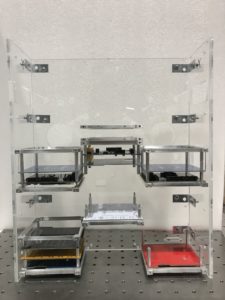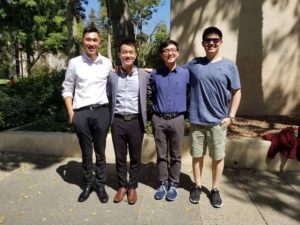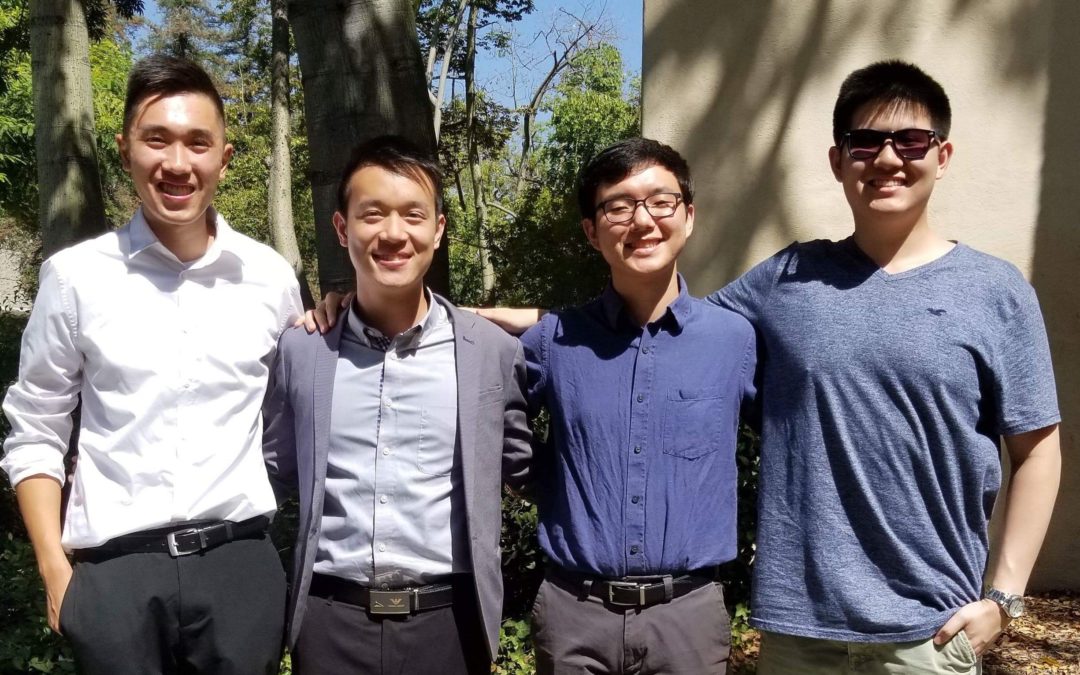This is the first post in the “Victory Circle Student of the Month” series, where a Base 11 student is highlighted and featured.
The journey to the “career of one’s dreams” is rarely if ever linear, and the pressure to define and pursue one’s life passion can be particularly daunting. Pasadena City College student Nathan Sam was no stranger to this pressure, but after completing his summer fellowship at Caltech’s Aerospace Mentorship Program, Nathan quickly discovered his love for mechanical engineering and space exploration. We sat down with Nathan to hear more about his story.
Q. What led you to pursue aerospace?
Coming into college, I had switched majors twice. I initially thought I would graduate and become an architect but that path had fallen apart since I didn’t find much interest in the major. I thought about what other majors would pique my interest, and I had several friends suggesting computer science. Back in high school, I did take a coding class and found it interesting so I decided to listen to my friends’ advice and take a course on computer science. After completing the first course, the strive for computer science was diminished due to the realization of me not wanting to sit in front of a monitor coding daily. Realizing that this was going to be the second time switching majors built up anxiety and caused me to fall in a depressive state. The main factor of the depression was the fear of not being able to support my mother in the future. A month passed and I finally decided to ask for help because I was going nowhere tackling this challenge by myself. I went to visit my school’s career counselor and was directed to talk to Katherine Swain. To be quite honest, it was difficult for me to ask for help as I usually keep things to myself but thankfully I realized getting help was the right choice because after several sessions with Katherine, I knew that mechanical engineering is the perfect major for me.
After all of the counseling sessions and the experience gained from the Base 11 Caltech program, I can confidently say that my major is mechanical engineering with an interest in working in the aerospace industry. I am interested in both the aeronautics field and astronautics field but I feel that I am leaning towards astronautics due to the main interest of NASA’s Mars Exploration Program and space exploration in general.
Q. What inspired you to apply for the Base 11 Caltech program?
After figuring out I wanted to be a mechanical engineer, I needed to see what it may be like to work in that field. My counselor said the only way to do that was to apply for internships. I was then advised to meet with a STEM counselor, who brought up an organization called Base 11. He informed me that this organization helps community college students gain work experience and partake in hands-on projects. As this was my first time applying for internships, I was nervous but decided to try my luck in applying to Base 11. I then received a call from Base 11 congratulating me on landing a position at Caltech in the Aerospace Mentorship Program.
Q. Describe what you worked on at Caltech.
I had the opportunity to work on a reconfigurable space telescope called AAReST (Autonomous Assembly of a Reconfigurable Space Telescope). My main objective was to prepare the space telescope for assembly since the telescope is expected to launch sometime in 2020. A major task that helped me complete my objective was to model cables for connectors and electrical components.

The acrylic model of the CoreSat that Nathan worked on.
The purpose was to analyze which connectors or components needed to be repositioned to allow the cabling process to be easier when assembling the entire space telescope. Another task was to help update the flight CAD (Computer-Aided Design) model. My duty was to integrate the updated internal components to the new structure that was being designed and perform minor changes that were needed. Overall most of my time was spent on SolidWorks (CAD software) modeling new connectors and updating the flight CAD model. By working on these tasks, I was able to provide the team an updated version of the flight CAD model that brought it a step closer to the final manufacturing and assembling stage.
Q. What happened following the completion of your Base 11 fellowship at Caltech?
After the program had ended, school was about to start for me. I was sad that the program had ended so quickly as I already started to miss the friends and experiences that I made at Caltech. Several weeks before the program was about to end, I had spoken with my mentors about continuing my work during the academic year since I enjoyed learning and working with them throughout the summer. Surprisingly, my mentors had agreed and started the paperwork to get me back at Caltech in September. With the previous status of being a summer student at Caltech, I was given the opportunity to be a part time staff at Caltech working as a lab assistant. With more time, I am able to continue learning from my mentors and gaining helpful advice from the team in which will help with my academic and professional career.
Q. In what ways did the fellowship help you towards your goals?
By going through this fellowship, I was able to confirm my interest in mechanical engineer in the aerospace industry. The fellowship gave me a huge insight into what it takes to operate a mission. The fellowship taught me subjects that I originally wasn’t able to do, from learning how to work independently to having the courage to conduct a technical presentation to the team and the general public. All of the knowledge I gained from the fellowship will definitely prepare me once I step into the professional field.
Q. What are you up to nowadays?
I am still working at Caltech on AAReST and still enjoying every minute of the project! I also got the opportunity to be involved in a online academy presented by NASA called L’SPACE Virtual Academy. The program consists of groups of 10 members and the project is to design a concept mission of sending a probe to Mars to locate an ideal location that has water present and is also habitable for future human exploration. During my spare time, I am learning how to code in Python. Though I did not have a great history with coding, I decided to try again and this time I am enjoying the process since I can control the pace in learning.

Nathan (left) with some friends he made at Caltech.
Q. What are your plans for the future?
Transferring is a major plan at the moment. I decided to stay in state and apply to both California State University campuses and University of California campuses. My main hope is that I can transfer into a UC since I am interested in graduate school. The experience I gained from Base 11 is the main reason I am now considering graduate school. Aside from school and work, I have been applying for internships for the summer. The main agencies/companies that I have been applying to are JPL/NASA, Boeing, Lockheed Martin, and Northrop Grumman.
Q. What are your dreams for your future career?
My dream for my future career is to help with the progression of space exploration, especially the mission to Mars, by working at JPL. Whether it is building instruments for orbiters, creating hardware for a rover, or anything that helps progress space exploration, I want to be apart of that team! By pushing space exploration, it will push technological advancements and I hope with my efforts, what I create will also benefit humans on Earth. By helping with the mission to Mars, I also hope I can be a part of the team that will put a person on Mars and bring him/her back! If that day comes, I believe I can say I have accomplished my career goal.
Q. What advice do you have for students looking to pursue the field of aerospace/STEM?
The advice that I would like to share is to learn how to ask for help. It may seem like a simple concept, but I believe many people have trouble with this. I am still hesitant to ask for help sometimes, but I just need to remember that people generally want to help. Help usually does not come to you unless you initiate it first by asking. STEM, in general, is a very difficult field to be in, so by having people who are able to help, you will make the journey a little less stressful. If I did not choose to ask for help, I would not have known about Base 11 or that mechanical engineering was the right major for me. By not initiating first, I also would not have had the opportunity to work at Caltech and continue working on the amazing project and meeting extraordinary people. Putting yourself out there can bring in many benefits to help advance your career and life in the STEM field.

